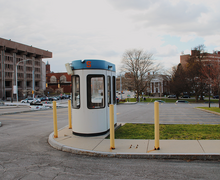Roadblock: Student Association reflects on stalled status of two initiatives
Members of Student Association, along with President Dylan Lustig's current cabinet (above), worked to pass the cyber bullying and smoke-free initiatives, but were stalled by the administration. So far, no headway has been made.
Student Association members constantly work on initiatives, many of which have been successful in the past. However, in the last several semesters, two heavily discussed and well-known projects have been seemingly stalled by means outside the control of the representatives themselves.
SA President Dylan Lustig’s administration sat down with The Daily Orange to discuss the initiatives in question, what inspires these proposals and the status of certain plans that have received much campus-wide attention at Friday’s cabinet meeting. Several of these plans, including the cyberbullying and anti-smoking initiatives, have not seen tangible results.
During SA’s last session, the general assembly passed a resolution that acknowledged the presence of cyberbullying on campus and stated that students should not tolerate it, said PJ Alampi, chair of the Student Life Committee.
Taylor Carr, chief of staff, said the point of the resolution was to call on the administration to change the Code of Conduct at SU and label cyberbullying as form of harassment.
Carr said the codes do not say anything about cyberbullying, which makes it difficult to meet the requirements that classify something as harassment.
Alampi said SA is looking to eventually create a program to educate students on cyberbullying and how to prevent it. It will be presented to fraternities, sororities and incoming students during orientation. The program would be crafted with the help of the LGBT Resource Center, Residence Hall Association and the Pan-Hellenic Council.
He said there is no set date for the program to launch, as the opinions of different groups are still being discussed.
Although SA is hoping to see changes in the near future, Carr said the last time he checked on the issue after passing it on to the administration, the administrators were still consulting with their lawyers —meaning there has yet to be an official change.
The next step in the process is to consult with administrators at the Office of Judicial Affairs, whom Carr initially discussed the changes with, he said.
‘There are policy and education sides: Policy is changing the Code of Conduct, and education is informing people there is a prevalence of it and what they can do to stand up to it,’ Carr said.
Another stalled project is the smoke-free campus initiative. Alampi said there is currently no movement within SA concerning the proposed program.
‘The program is at an administrative standstill,’ Alampi said.
Jessica Cunnington, former vice president of SA, spearheaded the smoke-free initiative after she was approached by Colleges for Change, an organization that works with college campuses to take a vow to be smoke-free or limit smoking.
‘It seemed bigger than the average initiative, like sending buses to Wegmans,’ said Cunnington, who did not attend the cabinet meeting, as she is no longer a member of the organization.
Two semesters ago, the organization approached SU and SA to conduct its own research collecting opinions of smoking on campus from approximately 3,000 to 4,000 students, Cunnington said.
SA soon formed a committee to work on the proposition of creating limitations for smoking, Cunnington said. The purpose of the committee was to reach out to the student community and get verbal feedback.
The committee received mixed results, Cunnington said.
‘Some students didn’t like walking through the clouds of smoke in front of Bird Library, but other students were like, ‘It is my right to smoke,” she said.
The SA committee began to draft different solutions and present them to the University Senate’s health and wellness committee, Cunnington said.
SA proposed several different options to the USen committee, such as creating designated smoking stations or placing a ban on how closely people could be to buildings while smoking, Cunnington said.
Cunnington said she expected to receive the results from USen after the final meeting during the spring 2011 semester. However, the summer passed, as did the following fall semester, with no word of development. She said the initiative essentially disintegrated.
‘Maybe now isn’t the right time. There is no overwhelming majority here, and maybe students thought other things were more important,’ Cunnington said. ‘Maybe the school is too big for something like this and such a general decision.’
Cunnington said SA did what it had to do to advance the initiative the best it could before it was consumed by the administration.
During Friday’s cabinet meeting, current SA Vice President Allie Curtis said it is important to note that SA now has enough people to make a change.
‘Even though we are 30 percent less full than last semester, and we are still working to get the number back up, we have hard-working, quality people to get things done,’ she said.
In the past, initiatives were dropped after members left SA.
In response to this, Lustig’s cabinet is making changes to the way initiatives are conducted. Members will note the people in charge as well as the initiatives’ progress to ensure they do not get dropped, Alampi said.
With this system, initiatives will be thoroughly documented so that someone new can assume the role of conducting the operation, Alampi said. This way, students will not be negatively affected if a member leaves the assembly, and progress can continue from one session to the next.
Said Curtis: ‘We are tracking them, step by step, to see how much has been completed and how much closer we are to implementing this change.’
Published on February 12, 2012 at 12:00 pm





